We are all familiar with how difficult it is to learn the technique of the Olympic lifts, or any similar athletic movements. The field events, gymnastics, and martial arts – all are complex and require some time to master. Practice can improve technique, but that same technique can desert you in times of high stress.
This article will take a look at seven different ways stress can impact your technique, the signs to look out for, and how to keep stress at bay for improved performance.
RELATED: Why Technique Matters in Olympic Weightlifting
How Stress Impacts Strength and Motor Skills
Ironically, increased stress can actually help with strength. This is the familiar fight-or-flight response. Adrenaline is injected into the bloodstream, enabling some superhuman responses. This works well in regards to pure strength, but what is gained there is often taken away in the psychological realm.
Any technical movement is easier to do when you are not under stress. Just think of the last time you experienced a dose of psychological hyper-stress. You may have just had an accident or you may have forgotten a report before having to give it at a meeting with your bosses awaiting your every word. Panic city.
“Complex motor skills, like those needed for snatching or cleaning weights under conditions of speed and load, begin to suffer when stress mounts to problematic levels”
And how was your mental state? A bit scattered, I would imagine? You start shaking and suddenly nothing works – not your brain and not your body either.
Complex motor skills, like those needed for snatching or cleaning weights under conditions of speed and load, begin to suffer when stress mounts to problematic levels. The grosser, but more natural motor skills – like running, jumping, pulling, and pushing – do not deteriorate, but may even improve in many cases. This is why powerlifting thrives under higher arousal levels than those optimal in weightlifting.
RELATED: The Scientific Differences Between Weightlifting and Powerlifting
So what creates all this technique-killing stress and what can you, as an athlete, do about it?
Fatigue
Hall of Fame football coach Vince Lombardi once said, “Fatigue makes cowards of us all.” He could have added that it doesn’t help maintain technique either.
When tired, we automatically look for physical shortcuts. This can most easily happen when you unconsciously “forget” your technique when under pressure. Note how third attempt jerks are often not as crisp as the first snatch. Technique breaks down not just because of the lifts performed, but also due to the mental stress of two straight hours of competition, worry, and strategizing.
“When tired, we automatically look for physical shortcuts. This can most easily happen when you unconsciously ‘forget’ your technique when under pressure.”
External Worries
If you are stressing about exam time or bills, you will not have full mental potential available for the application of optimal technique.
Years ago, I was speaking with the great Canadian lifter Aldo Roy and we tried to define a “high-stress competition.” Aldo opined that a high-stress event was “when your girlfriend comes to sit in the front row holding hands with your worst enemy, just as you take your first snatch. THAT would be a high stress meet even if it was just a novice school meet.” Can’t argue with that one.
RELATED: How to Turn Stress Into a Strength

Increased Intensity
As your warm ups increase in weight, you feel more confident and your technique approaches optimal. You have not been stressed enough yet. As you approach your opening lifts in the competition, or your work sets in training, little deviations may intrude on your technique. The bar may move towards the edge of your area of balance.
RELATED: Arousal Management: The Science Behind Getting Mad at the Bar
As the bar gets heavier and heavier you may start to cut your pull short, missing lifts that should have been made. You are now feeling the stress and you unconsciously want to get the set over with as soon as possible. The result is a loss of height on the pull or jerk.
Audiences
Some lifters respond to audiences, some do not, often on the extraversion-versus-introversion pattern. The former are more wont to show off, the latter to break down under the gaze of someone who may evaluate them negatively.
Internal Pressures
Some of the most high-stress situations experienced by lifters come not from the outside, but from inside. Too-high expectations. Too much of a too-small ego. One of the worst of these sorts of pressures is the fear of failure-fear of success dichotomy.
RELATED: The 6 Reasons Your Success Depends on Your Failure
Most of us have some fear of failure. No one wants to train hard for months only to miss his or her lifts via psych-out. But perhaps the even bigger fear is the fear of success. Lifters with this fear think about what success will bring and become anxious about what will then be expected of them. That fear is usually that they will have even more pressure to perform even better. This then translates physically into a cut pull. Success averted!
Inexperience
Novices will experience more mental and physical deterioration due to the lack of previous similar stresses in their lives. One of the skills that needs to be acquired as you move up in strength is a greater tolerance for stress. This will enable lifters to still perform at optimal levels when the going gets tough.
The measure of a lifter’s technique is its consistency, at all intensity levels. It is not good enough to just hit a lift some of the time or with medium-level weights. You must hit it most of the time. If you can do that, then you will also develop more confidence and better tolerate stresses.

Lack of Technique Training
The lifts require practice. The absence of practice results in failure. Those who don’t practice technique will usually experience an unpleasant moment of truth on competition day. Some lifters try to get by with pulls and squats, and maybe some power snatches and cleans, during most of their training cycle. Then they try to learn to lift in the last week before their event. You will not automatically improve to acceptable levels just because you now need to.
“One of the skills that needs to be acquired as you move up in strength is a greater tolerance for stress.”
In addition, when under stress, there is a tendency to default to the way you first learned a movement. If your first coach taught you faulty technique, this will likely reemerge when fatigue causes your correct method to deteriorate. Thus, it is important to learn proper and rational technique in the first place.
RELATED: Reinforcing Movement Patterns in Weightlifting
The Take Home
In a competition, especially one with high stakes or closely matched opponents, it is often the psychological stress that will defeat you, not a shortage of strength. Put another way, your inability to manage that stress becomes the deciding factor in your performance.
Photo 1 “Snatch” by Jamie Jamieson. Attribution 2.0 Generic License.
Photo 2 “DSCF7083” by Yasunobu Hiraoka. Attribution-NoDerivs 2.0 Generic License.
Photo 3 “S0181855” by Yasunobu Hiraoka. Attribution-NoDerivs 2.0 Generic License.






